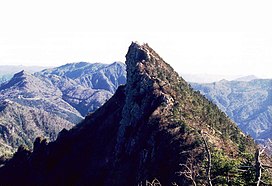Mount Ishizuchi
| Mount Ishizuchi | |
|---|---|
| 石鎚山 | |
 The highest peak of Mt. Ishizuchi | |
| Highest point | |
| Elevation | 1,982 m (6,503 ft)[1] |
| Prominence | 1,982 m (6,503 ft)[1] |
| Listing | Ultra |
| Coordinates | 33°46′03″N 133°06′54″E / 33.76750°N 133.11500°E[1] |
| Geography | |
| Location | On the border of Saijō and Kumakōgen, Ehime, Japan |
| Parent range | Shikoku Mountains |
| Geology | |
| Mountain type | Ruins of old volcano |
| Last eruption | 15,000,000 years ago |
Mount Ishizuchi (石鎚山, Ishizuchi-san) is a 1,982-metre-high (6,503 ft) mountain on the border of Saijō and Kumakōgen, in Ehime, Japan. This mountain is one of the 100 famous mountains in Japan. It is the highest mountain in Western Japan and the island of Shikoku.
Outline
[edit]Mount Ishizuchi is the highest mountain on the island of Shikoku and also the highest mountain west of Mount Haku. It is known as 'the roof of Shikoku' and the sharp, rocky summit resembles a huge stone hammer (石鎚, ishizuchi).
Mount Ishizuchi is an important object of worship in this region and one of the major centers of Shugendō, a sect of mixture of Shinto and Buddhism. At the top of the mountain there is a small shrine called the Ishizuchi Shrine. This mountain is also known as one of Seven Holy Mountains (七霊山, nana reizan). There are several sets of heavy iron chains (鎖, kusari) leading up to the summit and this is the route many pilgrims opt to take, the longest set being 68 metres (223 ft). However, it is possible to hike all the way to the peak along a trail which includes stairs and ramps with handrails.
The climbing season opens every year on July 1, and women are forbidden from climbing the mountain on this day.[2] Between mid-October and mid-November, people come from far and wide to view the autumn colours.
The area around Mount Ishizuchi is a major part of Ishizuchi Quasi-National Park.
Access
[edit]-
Mount Ishizuchi from South
-
Top of Mount Ishizuchi
-
A view of the middle of the mountain
-
A stone wall of the mountain
-
Mt. Ishizuchi from Joju
-
People ascending via the iron chains
Footnotes
[edit]- ^ a b c "Japan Ultra-Prominences". Peaklist.org. Retrieved 2015-01-01.
- ^ Masataka, Suzuki, ""Ishizuchi Shinkō" - Mountain Beliefs and Practices", Encyclopedia of Shinto, Kokugakuin University, retrieved 2021-08-18
References
[edit]- Guide to the Ishizuchi Mountains (Saijo City)
- the Geographical Survey Institute in Japan
- Ishizuchi Quasi-National Park
- ‘Yama to Shinko: Ishizuchisan’







